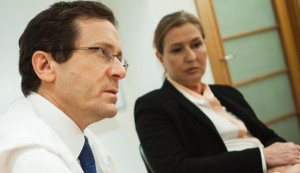
The Central Election Committee has cleared 26 political parties to take part in the election. According to public opinion polls the main fight for votes appears to be between the party currently in power, the centre-right Likud led by Binyamin Netanyahu, and the Zionist Union bloc of centre-left parties. The Zionist Union is made up of the Labor party which is led by Yitzhak Herzog, and the party Hatnuah with Tzipi Livni as its leader.
It should be pointed out that there are no particular ideological differences between platforms of Israeli political parties. Those parties that oppose territorial concessions to the Arabs are considered to be on the right, while those that support such concessions are considered to be on the left.
According to the polls, both Likud and The Zionist Union could potentially receive a broadly similar amount of seats in the new parliament. The gap between the two parties may be small, but neither of the leaders is able at the moment to form a government by themselves. This means they will have to open negotiations with other parties in order to form a coalition, the potential make-up of which is impossible to foresee; even Israeli experts shy away from trying.
Likud could have the support of Naftali Bennett’s party The Jewish Home; Bennett serves as Minister of the Economy in the current parliament. In the current pre-election race Bennett’s party is closing the gap on the frontrunners. The party Yisrael Beiteinu, led by Avigdor Lieberman, is ready to join a government on the political right, however the party is currently going through hard times after a spate of corruption scandals. Opinion polls show that Yisrael Beiteinu, founded as the so called “Russian speaking” party has lost around 40% of its voters. It isn’t out of the question for them to give their political support to other parties or to withdraw altogether from active campaigning.
Judging from pre-election rhetoric a serious fight for the “Russian speaking” vote has already begun with The Zionist Union assuming the most active role so far. On the February 22nd its leaders organised an official presentation of the party’s pre-election programme especially for a Russian speaking audience. It took place at Beit Sokolov, the home of the Israeli Journalist’s Association in Tel-Aviv.
A lot rests on which side the religious parties Shas and United Torah Judaism choose to make their stand on. Their leaders have declared their readiness to support a right government; however it wouldn’t be the first time they make their selection based on which party offered them the most favourable terms.
It is also possible that the left camp could have the support of the Israeli Arab parties. Four of these parties, The United Arab List, Ta’al, Balad, and Hadash, have formed their own voting bloc. According to weekly polling results this bloc stands to receive 11-13 seats in the next parliament.
Israelis of Arab origin comprise 20% of the country’s population. Around 55% of them vote in national elections. Specialists propose that the Arab parties should take a more active role in raising voter attendance in the time remaining before the elections, since currently the majority of Israeli Arabs don’t believe that regular elections can change their situation for the better.
Judging by the polls, it appears at the moment that Binyamin Netanyahu will be the head of the next Israeli government. Following quite closely behind is Yitzhak Herzog. However, seeing that a significant part of the electorate has still not decided who they would like to see as prime minister, neither Netanyahu nor Herzog can lay claim to the title just yet.
Experts say that the balance of power in the election race could quite literally change even during the last week before the elections. This wouldn’t be the first time for this to happen in Israel. Things will mainly depend on what compromising material will be unearthed in the pre-election fight, primarily in relation to the parties’ leaders, and the situation on the country’s borders.
Indeed the campaign to discredit Netanyahu has already started. It has even affected his wife, who has prompted condemnation from even the moderate parts of Israeli society.
Netanyahu is also hampered by the souring of relations between himself and Barack Obama. The American president intends to successfully conclude talks with Iran, but Netanyahu sees Tehran as a threat to the very existence of the Jewish state.
The Israeli prime minister plans to visit Washington on March 3 to talk in Congress about this issue. He was invited by the House Speaker John Boehner but Democrats have already said that they consider the invitation to be inappropriate and some Democratic congressmen have declared their intention to not attend Netanyahu’s speech. Vice-President Joe Biden has said he will be on a state visit to Latin America at the time. As announced by the White House, a meeting between Obama himself and Netanyahu in the run up to the upcoming Israeli elections of March 17 would be a breach of diplomatic protocol.
Bakhtiar Usmonov, Doctor of Political Sciences, political scientist, exclusively for the online magazine “New Eastern Outlook”.
